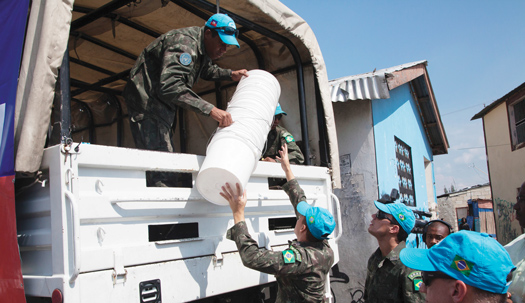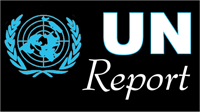UN votes to keep troops in Haiti as cholera case heads to court
By Saeed Shabazz -Staff Writer- | Last updated: Oct 23, 2014 - 8:46:49 AMWhat's your opinion on this article?

The Community Violence Reduction Section (CVR) at the United Nations Stabilization Mission in Haiti (MINUSTAH) is part of a joint pilot project with the Direction Nationale de l’Eau Potable et de l’Assainissement (DINEPA) to install water fi ltration systems and provide hygiene training in the Cité Soleil slum of Haitian capital Port-au-Prince. The partnership between MINUSTAH and DINEPA forms part of joint efforts between the United Nations and the Government of Haiti to fi ght cholera. Photo: UN Photo/Nektarios Markogiannis
|
UNITED NATIONS (FinalCall.com) - By a 15-0 vote the UN Security Council continued its military presence in Haiti which began in 2004. Reaffirming that Haiti was at an “important juncture” in the consolidation of stability and democracy, the Security Council extended the mandate of the United Nations Stabilization Mission in Haiti (MINUSTAH) until October 15, 2015 at a cost of over $500 million. The vote took place Oct. 16.

|
There are presently 7,324 peacekeeping personnel on the Caribbean island. However, UN Secretary-General Ban Ki-moon in his report to the Security Council recommended a drawdown to 2,370 troops and 2,601 police personnel by June 2015. The Security Council called on the Secretary-General to ensure that a force level close to the current size would remain in Haiti until his next report, which is due 45 days prior to the expiration of the mandate.
“It is obvious that we are dealing with a foreign occupation for reasons that cannot be confessed but are surely perverse,” Patrick Elie, Haitian political activist, who served as former Pres. Jean-Bertrand Aristide’s Secretary of Defense told The Final Call.
The Security Council reasoned in its Resolution 2180 (2014) that because Haiti has not held “some elections” for three years and that “Haiti still does not have an amended electoral law nor a Provisional Electoral Council, it would be impossible to hold presidential elections on October 26; therefore the peacekeeping mission must stay.
“If it plays any strategic role at all, the United Nations paramilitary is playing a role contributing more to creating chaos than peace. The Haitian people have witnessed in the past few years, the raping of their land and people by hostile forces disguising themselves as friends of Haiti,” argues Jean Robert Lafortune, a human rights activist who monitors MINUSTAH actions and heads the Haitian American Grassroots Coalition in Miami, Fla.
“Ban Ki-moon, was in Port-au-Prince earlier this month, and was the object of large protests,” Mr. LaFortune told The Final Call.
The UN secretary-general has not been the only one to feel the wrath of angry Haitians. On Oct. 10, thousands of Haitians protested in the nation’s capital against U.S. meddling, while demanding the departure of Pres. Michel Martelly, who they say has done nothing for the nation. He has been accused of delaying elections, corruption allegations and blamed for rising poverty and high unemployment, according to reports.
Speaking after the Security Council vote, and not mentioning any opposition to MINUSTAH by the Haitian people, the U.S. ambassador to the UN, Samantha Power said, “The United States looked forward to continued work together and with Haiti to achieve durable peace, security and democracy.”
The U.S. is occupying Haiti under the illusion that Washington wants to see democracy, argues Ezili Danto of the Connecticut-based Haitian Lawyers Leadership Network. “The UN Security Council states that it wants to see elections, and that is a sham,” Ms. Danto told The Final Call. “The UN publicly laments no election, but underneath that is a UN/U.S. desire to rule Haiti by decree,” she added.
How can anyone take the UN or U.S. seriously concerning elections when the largest political party in Haiti, Lavalas is banned from participating?” Ms. Danto asks.
Meanwhile, on Oct. 23, a New York federal judge, J. Paul Oetkin in the Southern District is scheduled to hear oral arguments in a lawsuit brought by Haitians concerning the cholera epidemic that began in October 2010.
Cholera is a bacterial disease that can cause diarrhea and dehydration, and ultimately death. It is most often spread through the ingestion of contaminated food or drinking water that may be contaminated by the feces of an infected person or untreated sewage, according to the Centers for Disease Control.
The Boston-based Institute for Justice & Democracy in Haiti argues that cholera was brought to Haiti by Nepalese peacekeepers, and therefore, the UN must give compensation. According to UN data, 8,300 Haitians have died and 650,000 have been sickened. The UN says it enjoys immunity under a 1946 Convention.
The CDC said the evidence strongly suggested the UN peacekeepers from Nepal were the source of the cholera epidemic after they set up camps near a major river.
The lawsuit asks the court to declare that the UN does not enjoy legal immunity from liability. The U.S. in a 15-page letter to the court on July 7 said “member states of the UN have provided the UN with absolute immunity so that it can carry out its important work throughout the world without having to face the burdens and expenses of litigation in the courts of its many members.”
The letter signed by U.S. Attorney Preet Bharara also notes: “The United States has consistently asserted the absolute immunity of the UN to lawsuits filed against it in U.S. Courts, and the courts have consistently upheld the UN’s immunity.”
In the corridors of the UN, the question is whether anyone from the Secretariat would appear in court on Oct. 23. “We don’t have anything to say on this just yet. I’ll let you know when that changes,” Deputy Spokesman for the secretary-general Farhan Haqq told The Final Call.
INSIDE STORIES AND REVIEWS
-
-
About Harriett ... and the Negro Hollywood Road Show
By Rabiah Muhammad, Guest Columnist » Full Story -
Skepticism greets Jay-Z, NFL talk of inspiring change
By Bryan 18X Crawford and Richard B. Muhammad The Final Call Newspaper @TheFinalCall » Full Story -
The painful problem of Black girls and suicide
By Charlene Muhammad -National Correspondent- » Full Story -
Exploitation of Innocence - Report: Perceptions, policies hurting Black girls
By Charlene Muhammad -National Correspondent- » Full Story -
Big Ballin: Big ideas fuel a father’s Big Baller Brand and brash business sense
By Bryan Crawford -Contributing Writer- » Full Story






 Click Here Stay Connected!
Click Here Stay Connected!








